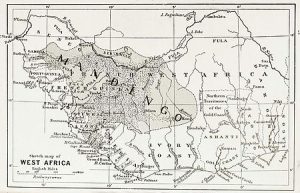By Sarah-Claire Jordan
 Mandinka, also known as Mandingo, is the native language of the Mandinka ethnic group of West Africa. It is spoken by 1.3 million people all over the world, and yet it isn’t a language that tends to be thought of even when discussing the major languages of Africa. However, that doesn’t make Mandinka any less of an influential and important language. Here are five things everyone should know about this language:
Mandinka, also known as Mandingo, is the native language of the Mandinka ethnic group of West Africa. It is spoken by 1.3 million people all over the world, and yet it isn’t a language that tends to be thought of even when discussing the major languages of Africa. However, that doesn’t make Mandinka any less of an influential and important language. Here are five things everyone should know about this language:
1. It is native to 10 different countries
Since the native people who speak Mandinka, who share the same name as the language, are native to West Africa, most of the countries where you will find native speakers of Mandinka are in this region of Africa. Mali, Chad, Senegal, Sierra Leone, and six other countries are home to native Mandinka speakers, and it is a recognized minority language in Senegal. Because it is spoken in so many different countries, there are many different dialects of Mandinka, some of them as different from each other as Spanish and Portuguese.
2. Three different writing systems are used for writing Mandinka
Though it has three different writing systems, a Latin system, an Arabic system, and the N’Ko system (also used for other languages in the Mande family), it’s not uncommon for a native Mandinka speaker to not know how to write. The most common writing system is the Arabic-based system, which has been used the longest by the Mandinka people. The N’Ko system is actually very recent, as it was developed in 1949.
3. The history of the Mandinka people is impressive
The Mandinka people originally come from West Africa, which means their ancestors were part of the Mali Empire. Later, the Mandinka had their own empire to the west of the Niger River, the perfect spot for farming at that time. Nowadays, the only country where Mandinka is the majority ethnic group is Gambia, and everywhere else Mandinka people and their language are considered minorities.
4. Oral tradition is very important in Mandinka culture
The culture of the Mandinka people is very rich, and has a strong emphasis on music and storytelling. Young people learn their history through songs and stories. Stories are popular, but most Mandinka prefer to hear their stories in the form of song. Those who sing this type of music are called griots and their singing is accompanied by the kora, a typical Mandinka instrument.
5. Mandinka reached the U.S.
During the height of the Atlantic Slave Trade, many people from West Africa were captured and sold into slavery in the New World. Many of these people were native speakers of Mandinka, and witnessed their native tongue become different kinds of pidgins and creoles. You can still see the influence of Mandinka in some words typically used by African Americans, like the word “mumbo jumbo.” On top of that, you can even find some native speakers of Mandinka in the U.S., as they continue to migrate from West Africa to the U.S. and other countries throughout the world.



